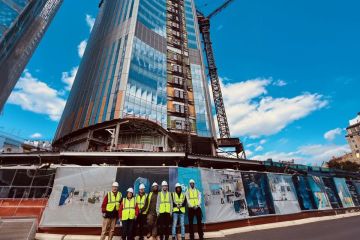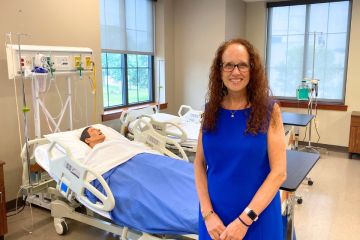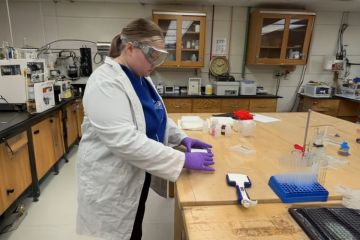New Engineering Dean is Trailblazer in the Profession

Widener welcomed Pamela McCauley to the university this summer as dean of the School of Engineering. She previously served as associate dean for Academic Programs, Diversity, Equity and Inclusion in the Wilson College of Textiles at North Carolina State University. We are excited to introduce her to the community.
Tell us a little about yourself and your background.
I’m originally from Oklahoma and grew up in a military family. My father was a U.S. Army Drill Sergeant and my mom was a secretary. My mom is the most optimistic person you will ever know, and my father was very much about discipline and planning. So I was blessed to grow up as a disciplined optimist! I pursued engineering because my father told me I was smart and I would make a good doctor. Once in college, I realized I probably wasn’t going to enjoy medicine, but I had a love for studying the human body. So, I focused on industrial engineering with an emphasis in ergonomics and biomechanics, where I could help the human body through engineering solutions.
The work of an engineer touches so many facets of our daily lives – from the roads we drive on and the software we use, to the food we grow and the technology that keeps us healthy. How do you think engineers are positioned to make a positive impact in the world?
The world of engineering touches almost every part of our daily lives. When you’re in engineering school, they teach you what is known as the engineering problem-solving approach. I think that has a greater footprint today than ever.
We have engineering solutions, addressing our agricultural needs our technology needs, our recreational needs, in every aspect of our lives. Engineering is well positioned to continue to make a positive impact in the world and an education in engineering positions students to change the world for good.
What do you hope to accomplish as dean of Widener’s School of Engineering?
I hope to continue the tradition of excellence started by former Dean Fred Akl, especially by continuing to attract great students and making the school a place where they feel welcome, valued and inspired to achieve their dreams. I hope they fall in love with their respective fields of engineering and realize the impact they can have on society and the world as engineers. I’m also very excited to work with the dedicated School of Engineering faculty and staff. I see tremendous opportunities for collaborative relationships with local industry, and to build out partnerships that are aligned with Widener strategic priorities.
What drew you to join the Pride?
When I first learned about Widener I was very impressed with the institution’s history and willingness to adapt to stay relevant in what I perceived as a genuinely student-focused and caring community. I felt a special connection almost immediately when I began the interview process, even from my initial zoom with the search committee. As I learned more about Widener’s history, as well as the current focus on agility and innovation, and the demonstrated ability to adapt to changing circumstances, I became more and more intrigued. What really moved me, though, was when I came to campus and saw the sincerity and commitment to student success. I met multiple faculty and staff who had been here for more than two decades, and I felt an energy that genuinely wanted to make everyone feel like they belong. I love the saying “We’re All Widener and You Belong Here.” The Widener community means that.
Throughout your career, you’ve advocated on behalf of diversity, equity and inclusion in engineering and across higher education. Can you talk about your commitment to inclusion and accessibility in this space, and why it is important?
I’ve been committed to supporting and advancing diversity, equity, and inclusion throughout my career. It is largely because I see what a wonderful career opportunity being an engineer provides and the ability an engineering education gives you to positively impact society.
I also know we need diversity of thought and perspective as we solve problems and address challenges through engineering. There are still many challenges that women and people of color face in pursuing engineering education, but I am hopeful that we are beginning to see this change on a larger and broader scale. That is one of the reasons I’m so excited about Widener’s culture of belonging. It makes a difference when people feel like they are a part of a community.
Similarly, how have you used your position as a female and a person of color in the profession to encourage young girls and people from typically underrepresented groups to seek out opportunities in STEM?
As an African-American female engineer, I have tried to use my position, power and influence to attract women and underrepresented groups to pursue careers in STEM in multiple ways. I have served as a mentor to many women over the last 30 years, who are students, young professionals, entrepreneurs, and young professors. Additionally, I have been involved in professional organizations as a leader and board member, including the Association for Women in Science (AWIS), Women’s Engineering Program Advocates Network (WEPAN), Society, Women Engineers (SWE), National Society of Black Engineers (NSBE), and many others. Additionally, whenever I am in a leadership role or position of influence, I always try to determine how I can help diversify the environment by bringing in more women and people from underrepresented groups.
I regularly speak at community events, conferences, and make myself available to media outlets to speak about STEM and lend my expertise to help people see a different type of engineer in me. To increase my reach, I also started the podcast “Stepping Up STEM,” which I hope to continue at Widener.
It takes generational impact to see the change we need in diversifying STEM, and particularly engineering. I’m hopeful we are beginning to reach that tipping point.
You’re an educator, a researcher, and a highly sought thought leader – among the many roles that you serve in professionally. We’re curious to know what you do for fun in your down time.
In my time away from work I very much enjoy time with friends and family. I enjoy cooking large meals for friends and family and entertaining and welcoming people into my home. I also enjoy reading, visiting museums and learning about other cultures and communities. My husband and I also love to travel, but the most wonderful thing I have right now is a new granddaughter! Our beautiful, precious eight-month-old granddaughter Jordan Rochelle has absolutely stolen my heart.
Who has been your role model – whether it’s in higher education, engineering, or your personal life?
I was blessed to have two parents that I really appreciate and admired. They taught me a lot about caring for family and really believing in myself. Beyond my parents I’ve been very fortunate to have good mentors throughout my career and my academic experience. From my high school biology teacher, Mrs. Bennett to Howard G. Adams, who was the first Black man I had ever met with a doctorate degree. Mrs. Bennett inspired me as a high school student and Dr. Adams encouraged me as an undergraduate and has been a mentor to me for almost four decades. He was the first person to tell me I should get a doctorate in engineering – he believed in me and helped me believe in myself at a level I never imagined. Beyond that, I have used what I call Biblio-Mentoring where I read books and get inspired and to some degree mentored by the experiences and stories of others.
Others who have been role models for me include Dr. Joan Wadlow, who was provost at the University of Oklahoma at the time I was a graduate student. It was the first time I had seen a woman in such a powerful leadership position, and it inspired me. Others I truly admire and have learned from their lives include Nelson Mandela, Norman Vincent Peale, Bishop T.D. Jakes, Oprah Winfrey, Melinda Gates, Maya Angelou, and Michelle Obama.



